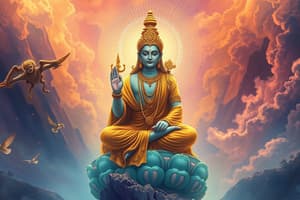Podcast
Questions and Answers
What is the origin of the term 'Hindu'?
What is the origin of the term 'Hindu'?
- A Latin term describing followers of Arya Dharma
- A Sanskrit word meaning 'river'
- A Persian word meaning 'river' (correct)
- An ancient Indian term for spirituality
Which of the following texts is considered part of the Shruti category?
Which of the following texts is considered part of the Shruti category?
- Mahabharata
- Bhagavad Gita
- Rig Veda (correct)
- Upanishads
During which period did the earliest Hindu practices emerge?
During which period did the earliest Hindu practices emerge?
- 3000-1600 BCE (correct)
- 1600-1200 BCE
- 1500-1200 BCE
- 2500-2000 BCE
What does the term 'Veda' mean in relation to Hinduism?
What does the term 'Veda' mean in relation to Hinduism?
Which Veda is associated with hymns for priests reciting during sacrifices?
Which Veda is associated with hymns for priests reciting during sacrifices?
What did 'Arya Dharma' refer to?
What did 'Arya Dharma' refer to?
Which of the following is NOT a characteristic of Shruti texts?
Which of the following is NOT a characteristic of Shruti texts?
Which collection of the Vedas emphasizes knowledge of rites?
Which collection of the Vedas emphasizes knowledge of rites?
Flashcards
Hinduism's Origin
Hinduism's Origin
Hinduism, the third largest religion, has no single founder and traces roots back to the Indus Valley Civilization.
Shruti Texts
Shruti Texts
Shruti scriptures in Hinduism are considered eternal truths, passed down orally and believed to be divinely revealed.
Vedas
Vedas
The Vedas are a group of sacred texts that comprise Shruti, containing hymns, prayers, and rituals.
Hindu Roots
Hindu Roots
Signup and view all the flashcards
Rig Veda
Rig Veda
Signup and view all the flashcards
Sama Veda
Sama Veda
Signup and view all the flashcards
Yajur Veda
Yajur Veda
Signup and view all the flashcards
Atharva Veda
Atharva Veda
Signup and view all the flashcards
Study Notes
Hinduism
- Hinduism is the third-largest religion, following Christianity and Islam.
- It has no single founder.
- The term "Hindu" originated from the Persian word "Hindu" (Sanskrit: Sindhu), meaning "river".
- The term "Hinduism" emerged in the 19th century to describe diverse belief systems in India.
- Historically, it was known as "Arya Dharma" or the "Aryan Way."
- The earliest Hindu practices date back to the Indus Valley Civilization (ca. 3000-1600 BCE), including Mohenjo-Daro and Harappa.
- The Aryans migrated to southern Asia (circa 1600-1200 BCE), influencing Hinduism.
- The oldest Hindu scriptures (Vedas) were compiled around 1500 BCE.
- Hinduism includes both pre-Aryan and Aryan elements from ancient times.
Sacred Texts - Shruti
- Sacred Hindu writings are categorized as Shruti and Smriti.
- Shruti literally means "that which is heard."
- Shruti was considered eternal truth, passed down orally until written down later.
- The Vedas form the core of Shruti, with four collections of texts.
Sacred Texts - Vedas
- The Vedas mean "knowledge" or "sacred lore".
- The four basic Vedic books are Rig-veda, Sama-veda, Yajur-veda, and Atharva-veda; including hymns, chants, rituals and spells.)
- Rig-veda: Collection of over a thousand hymns and verses for the Aryan gods.
- Sama-veda: Compilation of materials for rituals and sacrifices.
- Yajur-veda: Hymns and chants recited during sacrifices.
- Atharva-veda: Spells, incantations, and medicinal purposes.
- These texts were passed down through generations, using music, recitation, dance, and drama; Sanskrit is the language of the earliest known writings.
Studying That Suits You
Use AI to generate personalized quizzes and flashcards to suit your learning preferences.




